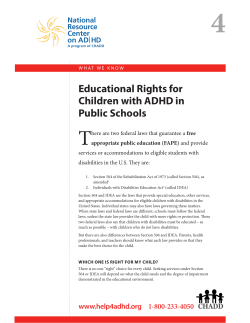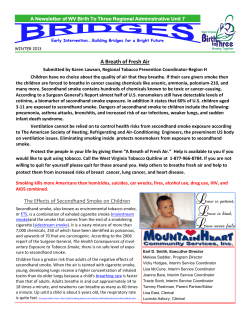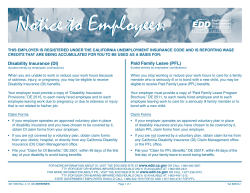
Supporting parents with learning disabilities Grandparents and the extended family
Supporting parents with learning disabilities Grandparents and the extended family Background Increasing numbers of adults with learning disabilities are becoming parents. Although reliable data is hard to come by, there are an estimated 56,500 such parents in the UK. In the absence of appropriate and timely support these parents are at a disproportionate risk of having their children removed from them. Considerable policy and practice development has taken place in recent years to support parents with learning disabilities. The Government Good Practice Guidance in England (DH/DfES, 2007) and equivalent Good Practice Guidelines in Scotland (Scottish Consortium for Learning Disability, 2009) set out parents’ rights to support to help them bring up their children. But the importance to parents with learning disabilities of informal support from the extended family – particularly grandparents – has received little attention. The importance of informal support Many parents (disabled or not) rely on informal support from their own parents – that is, their children’s grandparents – and other extended family members to help them manage the complexities of their day to day lives. In Spain, half of all grandparents look after their grandchildren every day. One in three families depends on grandparents for childcare, with 82% of children receiving some care from their grandparents. The positive impact of grandparent involvement on children’s wellbeing has recently been demonstrated by a large ESRC study (Buchanan et al, 2008; Griggs et al, 2010). For parents with learning disabilities, support from other family members may make all the difference to them staying together with their children, or having their children taken away. The English national survey of adults with learning disabilities found that nine out of ten mothers who were living with relatives still had their children with them, compared to only four out of ten who lived in their own households. About this paper The important, sometimes vital, contribution that the wider family can play in helping parents with learning disabilities and their children to stay together as a family has largely been ignored in the past. This paper starts to address that gap. It outlines key issues, and some strategies, in the involvement of the extended family in supporting parents with learning disabilities and their children, drawing on contributions from parents with learning disabilities from CHANGE (a national organisation running a network of and for parents with learning disabilities) and from a range of organisations providing support to family carers and members of the extended family, especially grandparents. The issues The problems faced by parents with learning difficulties in bringing up their children are well documented. Some of these may relate directly to their cognitive impairment – difficulties in understanding new or complex information, budgeting, or some of the practical details of looking after a new baby, for example. Others are a function of wider social problems – poverty and debt, poor housing, negative attitudes, prejudice and harassment. Fear of losing their child makes many parents unwilling to seek the support they need, especially from social services departments, particularly if they had had negative experiences or had a child removed from them in the past. As one parent in Scotland commented: ‘Asking for support from the organisation that takes your kids away is always going to be difficult.’ Even when parents do make contact with social services, the failure of children’s and adult services to work together can cause the family further problems. How can the extended family help? Grandparents – and other members of the extended family – can and do make a huge difference to parents with learning difficulties and their children in many of the areas mentioned above . They can provide a role model to children and grandchildren, as well as support, information, advice and childcare themselves or by helping their adult children in their search for such support from other agencies. Grandparents’ involvement and support can range from a little help and advice now and then to actually having parents and child living in their home with them – or even bringing up a child themselves, if the parents are not able to do so. At Family Action (an organisation providing practical, emotional and financial support through more than a hundred services based in communities across England) referrals for support for families where a parent has a learning disability often come in after a grandparent has died – indicating the key, but often invisible, support role they have played in helping the family function effectively hitherto. Where social services have cause for concern about a baby’s welfare or the ability of the family to cope, grandparents can form part of a child protection plan. In Sharon’s case (see story below) it was part of the child protection plan that she, her partner and their baby all went to live with her partner’s mother for the first three months after their daughter was born. The baby’s grandmother was given shared parental responsibility by the court, so Sharon could gradually get used to looking after the baby with help and support on hand. Supportive grandparents can also make a big difference to sustaining the input from voluntary agencies, like Family Action, that are providing support to parents and their children through local services. Sharon’s story Even before Sharon’s daughter was born, children’s services were concerned about her ability to bond with the baby and look after her appropriately. Sharon had had problems looking after her older son, many years before, so he lived with her parents. There was also concerned about Sharon’s partner’s use of drugs and alcohol. Part of the child protection plan when the new baby was born, was for all three of them to stay with her partner’s mother for three months. The baby’s grandmother was given shared parental responsibility by the court. Crucially, the arrangement meant Sharon had help and support at hand. Six months later, Sharon had the baby every day and two nights a week and was looking after her well; the rest of the time the baby was with her grandmother. Mother and baby had bonded and, at the time of writing, Sharon was looking after her daughter well. What help do parents want from their extended family? Parents consulted by CHANGE were clear about the help their own parents provided to them and their children: babysitting and childcare, parenting tips and advice, support during court proceedings and financial help, like presents to the children. In Steve’s case, support and help from his mother, who lived next door, meant he was allowed to keep his son after he split up from the boy’s mother. When Steve had to prove his parenting competence by undertaking a twelve week assessment course, he succeeded, he felt, because of the support and confidence he got from his mother. Roger was helped to learn about parenting – and to better understand children and their emotional needs by his mother and stepfather, while his aunt helped him deal with the difficulties he had with his children’s mother (his ex-partner). For other parents and their children, grandparents may provide a supportive home for them to live. Of course, for other people, grandparents and extended family members may be absent, live far way or not be supportive of the new family unit. What problems can grandparents face in trying to provide support? Grandparents wanting to support their son or daughter with a learning disability and their children can face a host of difficulties. Lisa’s mother, Jean, wanted to take care of her grandchild when social services were going to remove him from his mum. But social services said that Jean, at 59, was too old. Trisha’s mum was similarly told she was too old to be considered to adopt Trisha’s youngest child, who was disabled, because of her age – she was 69. These are the kinds of issues regularly raised by grandparents in touch with Grandparents Plus. For other grandparents a key issue can be that they are just not considered as a potential resource by the staff supporting their adult son or daughter with learning disabilities. These grandparents may have real anxieties about their offspring’s ability to manage as parents and a lack of confidence that adequate support will be available from the local authority to help them. Finding somewhere to voice their concerns, where they will be listened to, and identifying sources of support has traditionally been hard for these grandparents and for the Carer Support Services to which they might turn. In some cases where parents are unable (or deemed unable) to look after their children, grandparents may offer to bring up their grandchildren in their own home. This kind of arrangement is often called ‘kinship care’. Grandparents in this situation often have to fight to get this outcome. The Family Rights Group provides advice and information for parents and other family members whose children are involved with, or are thought to require, social care services. Grandparents who end up looking after their grandchildren in this way are usually offered much less support, especially financial support, than other registered foster carers. What can be the drawbacks for parents, if the extended family is involved in their lives? All families can find it hard when grandparents (or other members of the extended family) get involved in their children’s care. Different people, and different generations, have different ideas on the best ways to bring up and look after children. For parents with learning disabilities coping with different views on child rearing and resisting even well meant suggestions that they should do things differently is likely to be especially hard. Once their confidence in their own parenting skills has developed sufficiently, some parents with learning disabilities may feel the need to move away from living with their own parents, say, in order to live more independently with their children in their own family unit. Hanna Sigurjonsdottir and Rannveig Traustadottir provide some interesting examples of this in their accounts of three families ‘within a family’, that is parents with learning disabilities and their children who have had extensive support from their own parents and/or lived with them at some point. All three families they describe now live independently of their extended family, though still in close and positive contact with them. In other cases however, parents may feel that grandparents are trying to ‘take over’ their children. Alternatively, members of the extended family may not be seen by either parents or social services as helpful sources of support because of their negative attitudes, or their own inappropriate or abusive behaviour. What’s the impact on the children if the extended family is involved? Jytte Faureholm describes the findings of a study of 23 children of parents with learning disabilities who were interviewed twice over a ten year period. When they were first interviewed, at 8 to12 years old, there were aunts, uncles and cousins, many living fairly close by and the children were ‘thrilled about the grandparents with whom they often spent time’ . Ten years later, the children were young adults. Some of the young men talked about the important role members of the extended family had played in ‘rescuing’ them in their everyday lives. They had listened to them, backed them up and understood the challenges they faced – and the lack of insight sometimes shown by their parents. They had helped build up the young men’s self esteem and given them the courage to take charge of their own future. Several of the children who were consulted as part of the Scottish Consortium for Learning Disability’s 2008 pamphlet of stories of seven families where parents had a learning disability similarly said that ‘Having gran to help or other family members’ helped them deal with the problems they confronted, including practical things at home like washing, cooking, housework as well as being being bullied at school or in the community. For others, experience of the extended family had been less good. Instances of excessive drinking and fighting at extended family gatherings were negative, rather than positive, experiences for the children. Faureholm also describes an extended family which discriminated against, and excluded, one young man’s mother, because she had a learning disability: ‘The three of us (mother, father and son) feel that we get shoved aside from the family a bit…For my part I can only say that I couldn’t care less…If they can’t accept her then I can’t accept them.’ What can help grandparents or other family members to be involved? A key problem for many grandparents is the difficulty they find in getting recognition from social services departments of their role as a key source of support for their adult children with learning disabilities and their children. Family group conferences (FGC) are a decision making and planning process through which the wider family group makes plans and decisions for children and young people who have been identified either by the family or by service providers as being in need of a plan that will safeguard and promote their welfare. FGCs are not used as often with families headed by a parent with a learning disability as with other families but informal reports indicate they can be a useful strategy with positive outcomes for parents and children, including increased involvement from extended family members. More detail about FGCs and other helpful information can be found on the Family Rights group website. Conclusion A key theme from Tim and Wendy Booth’s study of 30 adult children of parents with learning disabilities (all of whom had remained with their families) was that ‘parental competence’ needs to be judged in its widest context. Outcomes for children are not simply a function of their parents’ skills, but of the skills and resources available to the children from their extended family (as well as family friends and the wider community). This underlines the need to broaden the focus of support and intervention from parent education and training to promoting and sustaining other kinds of informal support, including from the extended family. ‘Supporting disabled people to sustain a family unit’ is one of the desired outcomes of Putting People First, the English government’s programme for transforming adult social care (DH et al, 2007). Not all grandparents are in a position to play an active role in the lives of their grandchildren. But many are. From April 2011 working age grandparents who provide childcare for a child under 12 will be able to have national insurance contributions credited to help build up their state pension. This is just a start on the long road towards proper recognition of the important contribution of grandparents to the lives of their children and grandchildren and the important role they can play in helping parents, including those with a learning disability, to stay together as a family with their children. More information or advice CHANGE A national equal rights organisation led by disabled people. Campaigns for a better deal for parents with learning disabilities and their families: ‘Fighting for our children’. Activities include making accessible information for parents on how to look after their children, campaigning for changes in the law to better support parents and training parents on how to change attitudes towards them. Unit 41 Shine Harehills Road Leeds LS8 5HS Tel: 0113 388 0011 Email: info@change-people.co.uk www.changepeople.co.uk Family Rights Group Advises parents and other family members, including grandparents, whose children are involved with, or require, children’s social care services, because of welfare needs or concerns. Promotes policies and practices, including family group conferences, that assist children to be raised safely and securely within their families. Campaigns to ensure that support is available to assist grandparents and family and friends carers who are raising children who cannot live at home. Runs a free advice line and also provides advice in response to emails and letter. Second Floor The Print House 18 Ashwin Street London E8 3DL Helpline (free): 0808 801 0366 (Mon-Fri, 10-3.30) Office: 020 7923 2628 Email: advice@frg.org.uk www.frg.org.uk Family Action Provides practical, emotional and financial support to children and families facing complex and difficult issues, through over 100 services based in communities across England. Family Action Central Office, 501-505 Kingsland Road London E8 4AU Tel: 020 7254 6251 Email: info@family-action.org.uk www.family-action.org.uk Grandparents Association National charity supporting grandparents and their families. Runs a general helpline, a specialist welfare benefits advice and information service and a number of local support groups. Tel: 0845 434 9585 (helpline) 0844 357 1033 (welfare benefits advice and information) 0844 357 2907 (local support groups) 0127 942 8040 (office) www.grandparents-association.org.ukFA Grandparents Plus Champions the vital role of grandparents and the wider family in children's lives especially when they take on the caring role in difficult family circumstances. Works to support grandparents and the wider family by Campaigning for change so that their contribution to children's wellbeing and care is valued and understood; providing evidence, policy solutions and training so that they get the services and support they need to help children thrive; building alliances and networks so that they can have a voice and support each other, especially when they become children's full-time carers. http://www.grandparentsplus.org.uk Hft’s Family Carer Support Service Hft’s Family Carer Support Service offers support to relatives of people with a learning disability and family carers who have a learning disability themselves. Support is provided by telephone and email, through workshop courses, family carer focussed news digests and partnership working with groups and organisations seeking to improve the support family carers get. Family Carer Support Service Hft 5/6 Brook Business Park Emersons Green Bristol BS16 7FL Tel 0117 9061751 Email: familycarersupport@hft.org.uk www.hft.org.uk/Family_Carer_Support Learning Disability Wales Collective voluntary sector voice promoting progressive policies for children and adults with learning disabilities in Wales. 41 Lambourne Crescent Cardiff Business Park Llanishen Cardiff CF14 5GG Tel: 029 2068 1160 www.learningdisabilitywales.org.uk National Family Carer Network (NFCN) The NFCN links groups and organisations that support carers of people with a learning disability, including family carers who have a learning disability themselves. c/o Hft, as above Tel: 01883 722 311; 07747 460 727 Email: info@familycarers.org.uk www.familycarers.org.uk Scottish Consortium for Learning Disability A charity made up of 12 partner organisations working with people with learning disabilities and family carers to challenge discrimination and to develop and share good practice. Adelphi Centre Room 16 12 Commercial Road Glasgow G5 0PQ Tel: 0141 418 5420 Email: administrator@scld.co.uk www.scld.org.uk Working Together with Parents Network Network of professionals and others involved with parents with learning disabilities and their families which aims to support the development and sharing of positive practice in supporting parents with learning disabilities and their children, while safeguarding and promoting their welfare. Norah Fry Research Centre University of Bristol 3 Priory Road Bristol BS8 1TX Tel: 0117 331 0987 Email: wtw-pn@bristol.ac.uk www.right-support.org.uk References Booth, T and Booth, W (1997) Exceptional childhoods, unexceptional children, London, Family Policy Studies Centre Buchanan, A and Flouri, E (2008) Involved grandparenting and child well-being, Swindon, ESRC Griggs,J, Tan JP, Buchanan,A, Shalveet, AS, and Flouri, E (2010) ‘They’ve always been there for me’; grandparental involvement and child well-being. Children and Society, 24, 3, pp 200-14. Cleaver, H. and Nicholson, D. (2008) Parental learning disability and children’s needs: family experiences and effective practice, London: Jessica Kingsley DH/DfES (2007) Good practice guidance on working with parents with a learning disability, London: DH/DfES DH et al (2007) Putting People First: A shared vision and commitment to the transformation of adult social care, London: Department of Health Elvish, J, Hames, A, English, S & Wills, C (2006) Parents with learning disabilities: An audit of referrals made to a learning disability team, Learning Disability Review, 11, 2, 26 - 33 Emerson, E, Malam, S, Davies, I, and Spencer, K. (2005) Adults with Learning Disabilities in England 2003/4.www.ic.nhs.uk/statistics-and-data-collections/social-care/adult-socialcare-information/adults-with-learning-difficulties-in-england-2003-2004 Faureholm, J (2010) Children and their life experiences, in Llwellyn, G et al, Parents with intellectual disabilities; Past, present and future, Wiley-Blackwell Grandparents Plus (nd) Family life. A grandparents’ guide to supporting families through difficult times. www.grandparentsplus.org.uk/news_files/FamilyLife_Fullamended.pdf Grandparents Plus, Grandparents Association and Family Rights Group (2005) Celebrating grandparents and the extended family – a call to action Office of the Children’s Commissioner, 2010, Family perspectives on safeguarding and on relationships with children’s services www.childrenscommissioner.gov.uk/content/publications/content_405 Scottish Consortium for Learning Disability (2008) Fair deal for parents? Learning from the experiences of parents with a learning disability, Glasgow, SCLD Scottish Consortium for Learning Disability (2009) Scottish good practice guidelines for supporting parents with learning disabilities. Glasgow: Scottish Consortium for Learning Disability www.scld.org.uk/scld-projects/working-with-parents/parenting-guidelines.xhtml Sigurjonsdottir, H B and Traustadottir, R (2010) Family within a family, in Llewellyn G et al, Parents with intellectual disabilities; Past, present and future, Wiley-Blackwell Tarleton, B, Ward, L, & Howarth, J (2006) Finding the right support? A review of issues and positive practice in supporting parents with learning difficulties and their children. London: The Baring Foundation www.right-support.org.uk Working Together with Parents Network (2009) Supporting parents with learning disabilities and difficulties: stories of positive practice, Bristol: Working Together with Parents Network www.right-support.org.uk
© Copyright 2025















